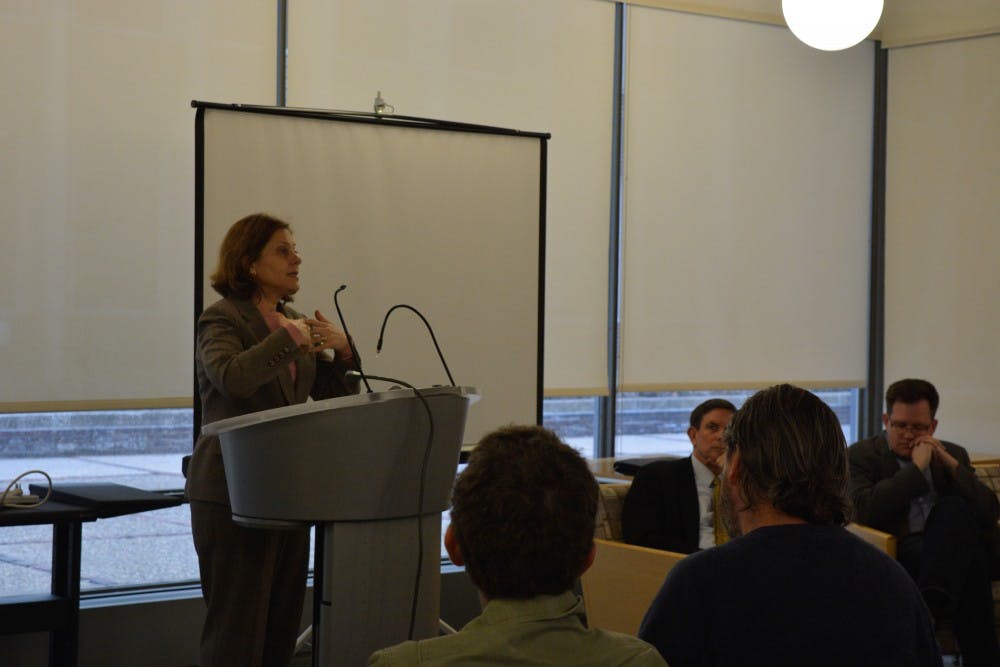
A Penn professor was joined by a Drexel University professor and a Princeton University professor Monday to discuss campus censorship amid the controversy surrounding free speech on school campuses and the subsequent harm that can stem from unrestrained expressions.
The Andrea Mitchell Center for the Study of Democracy hosted the event on Feb. 26. The three speakers included Sigal Ben-Porath, a Penn professor of education, political science, and philosophy and author of "Free Speech on Campus"; Keith E. Whittington, a politics professor at Princeton; and George Ciccariello-Maher, an activist and former professor at Drexel.
The panelists and attendees discussed why college campus censorship is dangerous and where to draw the line between hateful and controversial speech.
Whittington said he believes censorship at universities is dangerous because schools have a responsibility “to explore the controversial ideas” when they create dialogue, even if the ideas lead to dead ends.
“That effort to constantly press forward and test ideas is central to what universities do," Whittington said.
He instead encouraged universities to invite speakers to campus to debate controversial ideas because “universities are places where we ought to be able to engage ideas, where we hear ideas.” However, Whittington added that universities shouldn’t discourage particular voices because they go against the institution’s larger effort to advance certain ideas.
Whittington also advised against universities monitoring students on social media, as it has a "significant chilling effect on intellectual diversity."

Ben-Porath expanded on what Whittington said regarding the importance of free speech on campuses. She stressed the necessary conditions of an inclusive environment that people should create surrounding free speech so that people who are willing to speak can do so when they choose.
Ben-Porath researches on areas such as normative aspects of educational and social policy as well as the social and educational effects of war. Ben-Porath explained the way to balance free-speech controversies inside and outside of college, ideas also outlined in her book.
Referencing the recent controversy of a Princeton professor using a racial slur in his anthropology class that teaches about the limits of hate speech and blasphemy, Ben-Porath said the context of determining what counts as free and offensive speech can be subjective.
She added said the line between acceptable and unacceptable speech depends on each individual campus community. For instance, it is different to push boundaries of acceptable speech regarding racial minorities on a predominantly-white campus compared to a more diverse public university.
Attendees were glad to hear different opinions regarding the topic.
“I think it was really important to have a diversity of opinion listed here,” Penn staffer Katharine Miller said. She recognized the importance about how different groups of people may face different pressure when it comes to free speech. For example, Miller said, “students of color or immigrants in particular face material danger in a way that students in the mainstream don’t.”
College senior Esti Flamenbaum agreed with Miller. “Everyone agrees that basically free speech is good but it can get really difficult when you get to a very specific example, where it comes to violent rhetoric,” Flamenbaum said.
The event “was surprisingly well-reasoned and thought out. I feel it’s a good explanation of what the argument is for free speech on campus,” Flamenbaum said. “It’s a good explanation of what the difficulties are, and not necessarily where to draw the line but how you go about figuring out where the line might be.”
The Daily Pennsylvanian is an independent, student-run newspaper. Please consider making a donation to support the coverage that shapes the University. Your generosity ensures a future of strong journalism at Penn.
Donate



